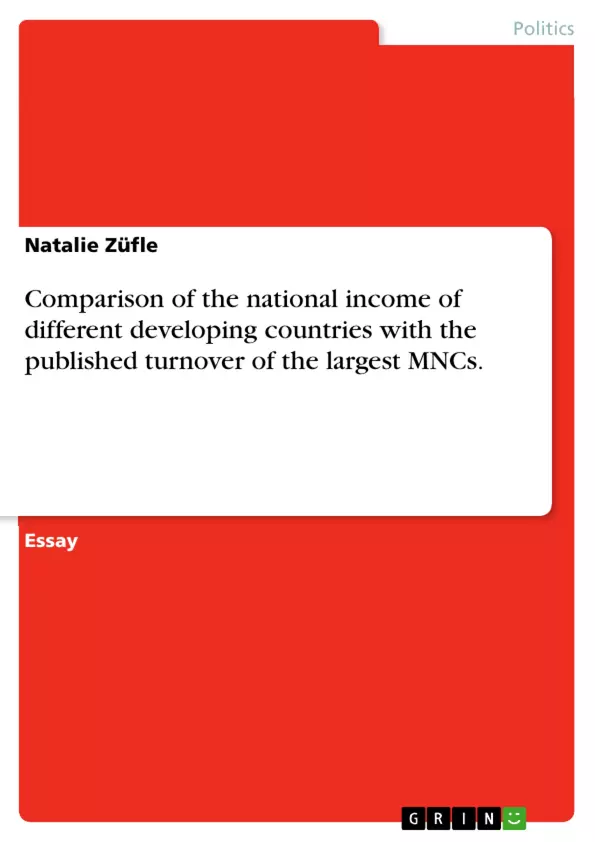Compare the national income of different developing countries with the published turnover of the largest MNCs.
Make a list of political issues usually object to governmental or parliamentary work, which are impacted by the activity of MNCs (e.g. tax law) and how they are impacted (e.g. by reducing corporate taxes).
Inhaltsverzeichnis (Table of Contents)
- Introduction
- Comparison of MNC Turnover and National Income
- Political Issues Impacted by MNC Activities
- Tax Policy
- Labour Policy
- Social Policy
- Monetary Policy
- Liberalization Policy
Zielsetzung und Themenschwerpunkte (Objectives and Key Themes)
The objective of this paper is to compare the annual turnover of the largest multinational corporations (MNCs) with the national income of developing countries. It aims to highlight the significant economic power of MNCs and analyze how their activities influence various aspects of national government policies in developing nations.
- The disproportionate economic power of MNCs compared to developing nations.
- The influence of MNCs on national tax policies.
- The impact of MNCs on labor policies and working conditions in developing countries.
- The effect of MNC investment on social policies and infrastructure development.
- The indirect influence of MNCs on national monetary and liberalization policies.
Zusammenfassung der Kapitel (Chapter Summaries)
Introduction: This introductory section sets the stage for the paper by presenting the core research question: a comparison between the economic power of multinational corporations (MNCs) and the national income of developing countries. It introduces the concept of MNCs as major global economic actors, whose annual turnover often surpasses the GDP of many developing nations. The introduction clearly states the intention to explore the significant influence that these powerful entities wield over national policies.
Comparison of MNC Turnover and National Income: This section presents a quantitative comparison between the turnover of the top five MNCs in 2006 and the Gross National Product (GNP) of several developing countries, including China, India, Brazil, Russia, and Mexico. The data dramatically illustrates the vast economic disparity, showing how the turnover of these MNCs rivals or surpasses the GDP of entire nations. The comparison extends to the least developed countries (LDCs), further emphasizing the immense economic power of the MNCs. This quantitative analysis provides the foundation for the subsequent discussion on the political implications of this power imbalance.
Political Issues Impacted by MNC Activities: This section delves into the political ramifications of the economic power of MNCs. It systematically explores how MNC activities significantly impact various national policies. The influence on tax policies is detailed, showing how MNCs' ability to shift operations to countries with more favorable tax conditions compels governments to offer tax incentives to attract investment. Similarly, the impact on labor policies, social policies, and monetary policies is examined. Each subsection provides concrete examples of how MNC actions pressure governments to modify regulations to remain competitive and attractive locations for foreign investment, sometimes at the expense of domestic welfare or effective national economic strategies. The analysis connects these distinct policy areas, showing that MNC influence isn't confined to one sector but is felt throughout national governance.
Schlüsselwörter (Keywords)
Multinational Corporations (MNCs), Developing Countries, National Income, Turnover, Tax Policy, Labour Policy, Social Policy, Monetary Policy, Liberalization Policy, Globalisation, Economic Power, Political Influence, Investment.
FAQ: Comprehensive Language Preview - MNCs and Developing Nations
What is the main topic of this document?
This document analyzes the significant economic power of multinational corporations (MNCs) in relation to the national income of developing countries. It examines how the activities of MNCs influence various national government policies.
What are the key themes explored in the document?
Key themes include the disproportionate economic power of MNCs compared to developing nations; the influence of MNCs on national tax, labor, social, monetary, and liberalization policies; and the overall impact of MNC investment on developing countries.
What is the objective of this research?
The objective is to compare the annual turnover of the largest MNCs with the national income of developing countries, highlighting the economic power of MNCs and their influence on national policies in developing nations.
What data is used in the comparison?
The document compares the turnover of the top five MNCs in 2006 with the Gross National Product (GNP) of several developing countries, including China, India, Brazil, Russia, and Mexico, and extends the comparison to least developed countries (LDCs).
How does the document analyze the influence of MNCs on national policies?
The document systematically explores how MNC activities impact various national policies, including tax policies (incentives to attract investment), labor policies (working conditions), social policies (infrastructure development), and monetary and liberalization policies. It provides examples of how MNC actions pressure governments to modify regulations.
What are the key chapters or sections of the document?
The document includes an introduction, a comparison of MNC turnover and national income, an analysis of political issues impacted by MNC activities, and a conclusion summarizing the key findings. Each section provides detailed information and analysis.
What are the keywords associated with this document?
Keywords include Multinational Corporations (MNCs), Developing Countries, National Income, Turnover, Tax Policy, Labour Policy, Social Policy, Monetary Policy, Liberalization Policy, Globalisation, Economic Power, Political Influence, Investment.
What is the overall conclusion of the document?
The document concludes that the economic power of MNCs significantly impacts the policies of developing nations, often influencing government decisions in ways that may not always benefit the domestic population or national economic strategies. The immense disparity between MNC turnover and the GNP of many developing countries is a key takeaway.
- Arbeit zitieren
- Natalie Züfle (Autor:in), 2008, Comparison of the national income of different developing countries with the published turnover of the largest MNCs. , München, GRIN Verlag, https://www.grin.com/document/180109



